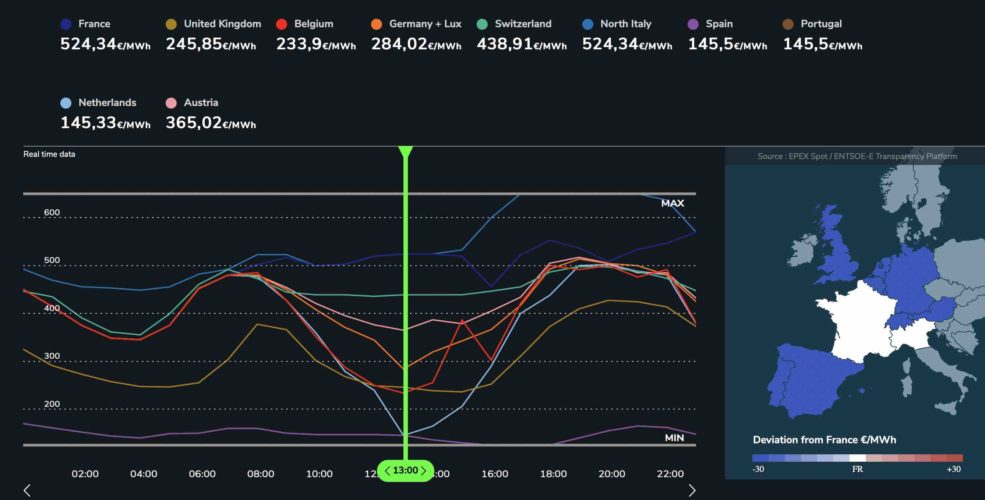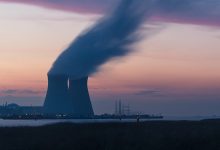Before Peter Dutton’s Coalition charge off into yet another inquiry into the merits of nuclear power, they might want to take a closer look at what’s happening in Europe, where the failure of France’s huge nuclear power plant fleet is causing bigger problems for EU power supplies than Russia’s withheld gas supply.
France has been delivering just a fraction of its energy production potential in recent months, and overnight the situation got worse when French power producer EDF announced another three power plants would curtail output because of rising temperatures. Rivers have become too hot in the latest heatwave to be used to cool the reactors.
The majority of France’s 56 nuclear reactors are currently throttled down or taken offline due to a combination of scheduled maintenance, erosion damage (worryingly, mostly at the newer plants of the ageing fleet) and cooling water shortages due to recurring heatwaves and droughts.
The problems with nuclear have caused wholesale electricity prices – both spot and forward contracts – to soar in France because it has become a net importer rather than exporter. Northern Italy, another grid heavily dependent on French nuclear supplies, has also suffered badly, and has spilled over into other markets.
And because France caps its consumer power bills – to maintain the myth of “cheap” nuclear and to protect French pride – the cost to EDF of making up the difference is now estimated at more than €24 billion ($A40 billion) this year alone.
Energy analysts now say that the French nuclear problems are a bigger risk to the EU power supply than Russia gas.
“The problem child in Europe’s power supply is definitely France,” Bruno Burger, an energy researcher with the Fraunhofer ISE, told the Die Zeit newspaper.
Burger says the significant power supply shortfalls in France will create problems elsewhere in Europe in the long-term too, as the low French output means scarcity on EU power markets and higher prices for everyone.
Germany heats most of its households using gas, and is therefore looking anxiously at a possible gas shortage this winter because Russia has cut off supplies. But French households mostly use electricity for heating, making a nuclear power shortfall a risk for the coming winter’s heat supply.
“Due to the many problems in its nuclear fleet, France depends on other countries more than ever – and can no longer supply other countries, like it did with Italy in the past,” he explained.
French power provider EDF told the Die Zeit that it cannot say when the country’s nuclear fleet will have overcome its ageing problems, saying “the programme for repair and maintenance will go on.”
According to Clean Energy Wire, the German-French Office for the Energy Transition (DFBEW) estimates that France’s “power gap” might persist for another 10 to 15 years, meaning that growing renewable power capacity will ultimately also benefit French customers.
That viewed is shared by a well respected Paris-based analyst known as “Jerome a Paris”, who writes that nuclear is in a long term decline in France.
“We could be facing a period of 10-20 years when France becomes structurally unable to produce its own electricity in full, and has to rely on imports from neighbouring countries, reversing the pattern of the past 30 years and straining the whole European power markets,” he writes.
(That view is backed up at least in the short term by the soaring cost of 2023 electricity futures contracts for the French market – the highest in Europe and recently priced at more than €600/MWh – or nearly $A1,000MWh for “baseload”.
“The recent decision by the French government to nationalise EDF is an implicit acknowledgment that this is becoming an existential crisis for the company and the country,” the analyst says,
He notes that most discussion about the EU power crisis is centred on Germany, but it is misplaced.
“All the criticism one can hear about Germany’s decision to close down its nuclear plants misses the fact that gas availability is not the problem for the power sector: the real problem is the unavailability of French nuclear,” he writes.

Germany’s power production (presented here as a percentage of total electricity production), has barely budged between 2021 and 2022, although its nuclear output was cut in half (from 11% to 6%) as part of its planned exit. The difference was taken by increasing renewables penetration.
(The remainder of the German nuclear capacity is due to be closed at the end of the year, but there is no pressure on it to extend that closure date, partly to cover the French nuclear shortfall).
“In other words, the gas price increases should have caused power price increases only at peak times, and not across the board,” Jerome says. “And yet prices for electricity have gone up massively and for much longer periods than one would expect from a mere disruption to gas availability.”
Jerome says that the war in Ukraine and its impact on markets is masking the depth of the problem in France. But not for long: “It will definitely trigger an ugly debate in France, given how unprepared the political class is for this energy transition.
Written with input from Benjamin Wehrmann from Clean Energy Wire.












